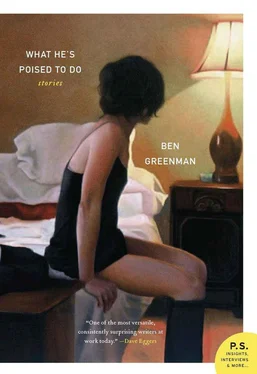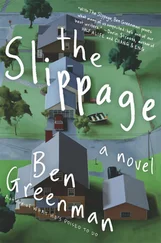You did not like the apartment. You felt that the closet was situated awkwardly in the master bedroom, and that the whole place was overpriced. I made a mental note to call the gay couple and tell them the apartment was theirs if they wanted it. On the way out, you picked up the Blood-Horse magazine, inspected the cover, put it back down. You paused by the door to tell me about yourself. You were a painter, beginning to acquire a reputation. Your father was a rich man, “like you,” you said, maybe believing it a little bit more this time. You had been engaged to one of your painting teachers, but it hadn’t worked out.
“Why?” I said. “If you don’t mind my asking.”
“You can ask anyone anything anytime,” you said.
One week later, we were lovers.
Dear X,
I fold your letter, unfold it, read it again, refold it. I have done this four or five times over the past hour. They say that you should keep your friends close and your enemies closer. The letter did not bother me so deeply when I first received it. As I have said, I called to talk things through. No part of it was unexpected. We had been weakening each other for months, especially since we stopped sleeping together. I realize that I have skipped from the moment when we became lovers to the moment when we stopped sleeping together. Between that is a gap. I will protect this period, not from shame, not from fear, but from love and from a fierce sense of obligation.
I can sketch what happened, but the sketch will not satisfy even the most casual reader. We were together. My marriage was stalled. I was making more money than ever, and enough that I could suddenly see clear to pay for any arrangement that might transpire: wife and mistress, ex-wife and girlfriend, ex-wife and new wife. One day, in bed, I made you an offer to come across to me. You refused. We lost and then regained our breaths. I asked again later, when you were not sitting astride me, when your face was not stretched with pleasure. You refused again. I backed off, nursed my wounds, waited a day, made another attempt, was rebuffed again, feared that the reopened wounds would never heal. I should have stopped making offers, but I could not, in this case, play it safe. You could say that it was a fatal flaw, but in fact it was the opposite: that was the one part of my life where I stayed the flaw and surged forward hopefully. Whenever I saw you, even if it was just for a casual drink or a cup of coffee, I felt an almost overwhelming sense of desire. You reported similar trouble, and we blamed each other, and we fought. And so I knew the day would come when either you would break or I would, and the broken party would ask the other party to release him or her forever. You broke. I fully believed that in time we would be lovers again. I felt the unfairness of the circumstance pulling at me. Once, when the pain was nearly too high to bear, I told my wife a version of the story, pretending that it had happened to an old acquaintance of mine back in Spain. “He suffered not just from his circumstance,” I said, “but from the anxiety that his circumstance might not have been unique in any way. Is there a word for that?”
“Pipe organs have devices called tremulants that create vibrato in the note,” she said. “At some point, time serves as a tremulant: everything that happens is just the minor recurrence of something that has happened.” It wasn’t exactly what I was looking for, but she seemed so happy that I didn’t object.
About a month ago, you and I met for drinks. We were not the only ones meeting. Since we stopped sleeping together, we have worked hard to construct a social structure around us that will permit us to remain in each other’s company. We have one or two mutual friends in business (my business) or in the art world (your art world). I have continued to collect, a pursuit that stretches my wife to the bounds of her indifference, and so she permits me to go out by myself and sit with what she calls the “albinic syba-rites.” At some point there is no dividend in following her language. Even if someone had called my wife and reported exactly who was sitting around the table, it would not arouse suspicion. A fifty-year-old collector with a sixty-year-old gallery owner, a forty-year-old journalist, and a thirty-year-old painter? The composition was perfect.
At this particular drink, you were nervous. Or rather: we were nervous, but you were showing it. We had been through a month of not speaking, and then a month of speaking every day, and then a day when you called me to say that you could not go through another month like it. “But it’s making me happy,” I said.
You sighed. “It’s making me miserable. I love talking to you. But I don’t talk to a man every day unless I’m sleeping with him.”
“Okay,” I said.
“Not okay,” you said.
The next night was the drink. You should have been asking the gallery owner about his fall shows. I should have been talking to the journalist and trying to extract the names of next season’s hot prospects. Instead, we spoke mainly to each other. At one point, the waitress asked us if we wanted more drinks, and I ordered for you. I am sorry. It was instinct. It doesn’t matter, anyway. No one noticed, not even the journalist, and after the second round of drinks, the conversation broadened, and there was nothing left for the others to notice. Around eleven, the party broke up. I wanted to walk with you a few blocks uptown before I got in a cab. You said no. It was cold outside. You wanted to go home and go to sleep. I insisted, and prevailed; we sat in a small restaurant and you drank coffee. “You didn’t even come to the show,” I said. I had converted one of my vacant apartments into a gallery, and I was showing work by Spanish painters I had collected over the years. The journalist had called it “a small show that produces large pleasures.”
“I was busy,” you said.
“You weren’t busy,” I said. “There was a woman there who said she had been at a drink with you just a half hour before.”
“I didn’t feel like coming,” you said. “I think that maybe you acquired some of those paintings because they reminded you of me.”
“What?” I said. “That’s idiotic.” But it was not idiotic. There was one portrait in particular, painted by a seventy-year-old Castilian, that looked almost exactly like you. If you had mentioned it specifically, I would have lied and said that I had owned that painting for years. I was not proud that you had turned my head far enough that I was buying paintings that looked like you.
“Maybe,” you said. She looked defeated. “All I know is that I didn’t want to be there, and I don’t really want to be here.”
“The show was important to me,” I said. “I would have liked it if you had made an appearance.”
“I know,” you said. “I’m sorry.” You looked like you might cry.
“I thought we were going to try to do well by one another,” I said. “If we’re not, then there are many other things we should discuss.”
“Like what?” you said.
“Like the new man,” I said. You had been to Los Angeles for a show of your work, and while you were there, you had started sleeping with a young doctor. He came to visit at least once a month, and while you told me without provocation that you weren’t in love with him, you also made it clear that you had no intention of ending things. It seemed that he was the perfect lover, at least for the moment. He did not live where you lived. He did not see you often enough, or for long enough, for you to grow bored, or to feel afraid that you were not feeling love — or worse, that you were. The perfection had a cost, which is that he was not in any true sense a real person. He was a coat you bought off the rack, an unsuperlative fashion statement. He was an appurtenance. When I told you that, your face darkened. You did not like me using my wife’s words.
Читать дальше












